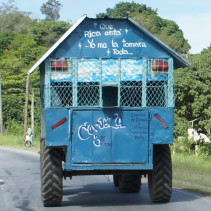

Like the lint roller.
Our delightful tour guide in Cuba was answering anonymous questions she’d asked each of us to write out on slips of paper. “Write down a question you might be hesitant to ask me … and I promise I will answer all of them,” was her instruction to us on the fifth day of our week-long People-to-People educational exchange program.
We were on a bus, rolling through the picturesque countryside en route to Trinidad, one of a handful of Cuban cities celebrating their 500-year anniversary.
On the two-lane highway, our driver, Orlando, deftly passed ancient tractors driven by weathered old farmers in tattered straw hats. Sitting in the back of the bus, I switched from left to right, snapping photos of crudely-constructed candy-colored shacks with fluttering lines of laundry. Horse-drawn buggies. Majestic king palm trees. A farmer in his rubber boots leading a pair of oxen. And the ubiquitous vintage cars and trucks that never fail to capture my attention.
Cuba – especially rural Cuba – is a place without frills, without modern technology, without many of the things we take for granted. (Toilet seats, for example. Dependable hot running water, for another example.) My favorite part about traveling here? The opportunity to have my most basic assumptions challenged. To be surprised and delighted by the simplest things. To connect with people who have been disconnected and denied much of the current technologies because of the aggressive and punitive embargo.
People like Grency, our tour guide – who humored us with a story about her delight and joy when she was gifted with a lint roller from a recent American traveller. “Every morning, before I leave home, I run that thing up and down my body. It’s the greatest invention ever!”
Her lint roller experience was part of her answer to the question that someone wrote on their piece of paper: “What do Cubans think of Americans?”
She continued, “We don’t blame the American people. We love Americans and find them to be happy people. More similar to Cubans than the Russians when they were here. And we think that Americans are very smart – they invented everything!”
She selected another paper from the little pile on her seat and read aloud, “What are your dreams?”
Without hesitation she said, “First of all, I want to travel. I would like to travel to the United States and see my friends. Our government now permits us to travel outside the country, but it’s not easy to get a visa from the U.S. But when I get there, I want to go to the Hard Rock Cafe and to MOMA and to all the modern art museums. You have wonderful museums in America! I want to see a TV show taping – Friends is my favorite show.” And she added with a twinkle in her eye, “I like Joey.”
“Also, I want to have internet connection at my home. I would like to buy a car – an old car, so that I don’t have to hitchhike to and from my home. I live near the airport, which can take more than an hour each way.”
Someone asked her what an old car would cost. “About 10,000 CUCs for a Lada that’s 6-8 years old.” (That’s more than $11,000.)
“And – more than anything, I want my son to grow up happy and carefree.”
With that simple yet poignant statement she reminded me yet again of the universality of humanity. Like all mothers everywhere, more than anything, she wants happiness for her child.
I love coming to Cuba because it slows me down. And it reminds me that simple is profoundly beautiful.
Comments??
Copyright 2025 WOW! Travel. All Rights Reserved.
5 Comments
Romaine mazer November 14, 2014 at 3:45pm
So close and yet so far away
Ann November 14, 2014 at 4:02pm
Marilyn, I loved reading this and equally loved seeing the photos…….. thanks for sharing! We still remember our trip to Cuba vividly, it was a memorable week!
Bob Franz November 14, 2014 at 4:24pm
And at first she couldn’t figure out what the lint roller was. A hair roller? Or dryer? Or kitchen thing?
Jill Stoliker November 14, 2014 at 5:04pm
CUBA a country in glorious technicolor, with all kinds of music spilling out into the streets that strums the spine and loosens the muscles to change the very way we move. Everywhere warm smiling friendly people will speak of the dark times while rebuilding their classic structures, their streets, their plumbing. Finally there is the possibility of achieving the dream of having their own small business serving others good food, a room to rest in a colonial home, or providing the basic comforts of a clean restroom and a few pieces of toilet paper for a reasonable price. Everyone seems to be creating innovative art with whatever they have available, including turning a junk yard into a neighborhood of artists, musicians, dancers and entrepreneurs who enthusiastically share their joy and talents with neighbors, children and tourists.
My most poignant observation was the education system: Small schools are opened in unused spaces within neighborhoods so that children may walk to school and home for lunch together. Educators are plentiful and dedicated. Childcare is provided free to working parents. Museums, concerts, ballet, parks, etc. are also used as classrooms, free and available to all.
It will take a long time for me to process all I have seen, heard, tasted, learned, as I sort through my glorious memories in the days to come. Marilyn, I am so grateful for all you have done to provide this memorable experience for me. WOW!!!
Tom Theriault November 14, 2014 at 5:08pm
Marilyn, great article that captures your passion, Grency’s warm humanity and our general observations. Let’s hope trips like this can help to open more doors and bring our countries closer together. The Cuban people deserve every opportunity to improve their lives and build on their love of life.